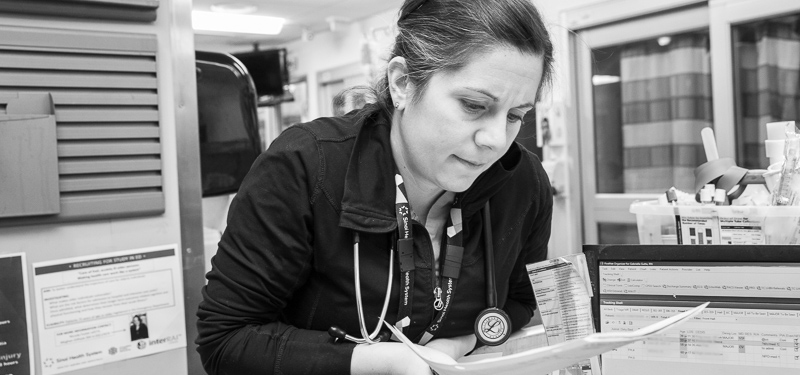
An emergency department is often the gateway to receiving health care but not everyone shares the same experience. A recent Trans PULSE report identified that one in five trans-identifying people have avoided accessing emergency care because of negative experiences they have had in the past, and more than half experience fear when going to emergency departments.
To further contextualize this issue, “trans people and especially trans women face significant marginalization and discrimination – known social determinants of health – even before entering a hospital,” says Marylin Kanee, Sinai Health’s Director of Human Rights and Health Equity. “Trans women tend to experience all the discrimination that cis women (people whose gender identity matches their birth-assigned sex) face such as violence, plus the discrimination they experience as trans people. We are working to ensure our spaces and practices are safer for these patients and staff.”
Dr. Nadia Primiani, Sinai Health System Emergency Physician is leading the way in Mount Sinai’s Schwartz/Reisman Emergency Centre.
“I believe feeling safe in a health-care setting is a basic human right no matter a patient’s gender identity,” says Dr. Primiani. “For trans women and in fact all trans patients, this means creating an inclusive environment where they are treated with the same dignity all patients deserve.”
There are many unique challenges this community experiences when seeking health care, stresses Dr. Primiani. These include hurtful language and assumptions, being referred to as their birth-assigned name or sex, having to educate their providers during vulnerable moments, and unwanted or unnecessary examinations. One of her examples is glaring: a patient with a broken ankle should not have to be questioned about their hormone usage.
At Mount Sinai, we’ve added a separate area to document name and pronoun from birth assigned sex and gender on intake forms in our emergency department. This serves as an important reminder to staff that they should not make an assumption about gender based solely on the name on their health card. These changes to date have been the result of training and education led by Dr. Primiani.
With proper access to training and more resources, Dr. Primiani is confident that the care for this community can be improved. She says part of the source of the issue is that physicians are taught very little about the LGBTQI2S population in our medical training, yet these patients are among those who have been marginalized the most. Since educating her colleagues on trans issues, she has found they are deeply interested in how they can improve their practice.
Her goal is to ensure all providers feel empowered in their interactions with trans patients, and so she attends rounds across the hospital and speaks regularly on this topic.
When asked if she has any tips for her colleagues, Dr. Primiani says: “start by asking a person’s name and pronoun and don’t ask about trans status unless it’s necessary. If you make a mistake, don’t be afraid to apologize and change your language from there.”
